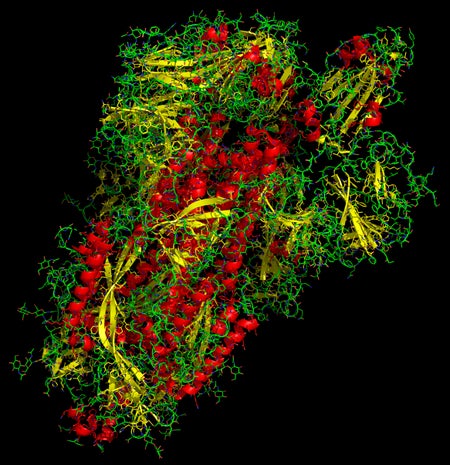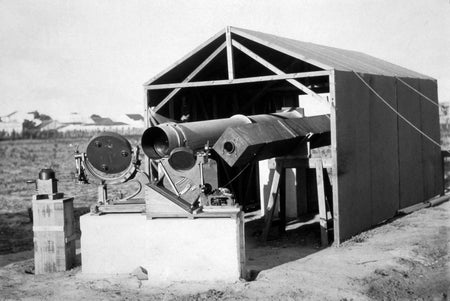
Amino Acid Rock Music Helps Build New Proteins
Some scientists teach computers to “see” proteins. Markus Buehler is teaching them to hear the compounds instead
Ron Cowen is a freelance science writer based in Silver Spring, Md., and author of Gravity's Century: From Einstein's Eclipse to Images of Black Holes.

Amino Acid Rock Music Helps Build New Proteins
Some scientists teach computers to “see” proteins. Markus Buehler is teaching them to hear the compounds instead

The 1919 Solar Eclipse and General Relativity’s First Major Triumph
Observations by Arthur Eddington vindicated the theory—even though his nation and Einstein’s had barely stopped pummeling each other in World War I

Our Ears Can Detect Cancer and Space Weather
Ears are such terrific pattern finders that scientists are using audio data to detect cancer cells and particles from space

Star Buzzed Our Solar System during Human Prehistory
A faint star with an even fainter companion came close enough some 70,000 years ago to perturb distant comets in our solar system

Gravitational Waves Discovery Now Officially Dead
Data from the South Pole experiment BICEP2 and the Planck probe point to galactic dust as a confounding signal

Mathematical Time Law Governs Crowd Flow
Pedestrians avoid bumping into each other by anticipating when their paths would collide

Black-Hole Mergers Cast a Kaleidoscope of Eyebrow-Shaped Shadows
The merged objects bend light around them into a "fractal" as they spiral each other

Scientists Close In on Creating Black Hole in Lab
Sound waves imitate famed Hawking radiation, energy spit out from the great cosmic sinkholes

Galactic Black Hole Fireworks Were a Flop
The giant "G2" cloud at the center of the Milky Way could be falling in a continuous stream, thereby inhibiting the spectacle that astronomers hoped for

Supernova Reveals Origins of Universe's Dust
Cosmic dust is crucial to the birth of stars and planets, but how so much of it came to be present in the young universe has been a mystery

Gravitational-Wave Findings Could Amount to Dust
The astronomers who announced earlier this year evidence of a signal from the dawn of time now are taking a more cautious stance

Quantum Method Closes in on Gravitational Constant
Cold rubidium atoms have provided a fresh approach to measuring Newton's big G

Habitable Planets Search Deflated by Stellar Wind
It's easier to detect exoplanets around M-dwarfs, the most common type of star in our galaxy, but these worlds also may suffer from a life-threatening solar wind

Doubt Grows about Gravitational Waves Detection
Two analyses suggest that the signal of big bang ripples announced earlier this year was too weak to be significant

Exoplanet's Rotation Detected for the First Time
A gas giant orbiting a relatively nearby star rotates every eight hours, its spectrum reveals

Gravitational-Wave Finding Causes "Spring Cleaning" in Physics
The big bang findings strengthen the case for the multiverse and all but rule out a "cyclic universe"

How Astronomers Saw Gravitational Waves from the Big Bang
Lead discoverer John Kovac describes his work at the BICEP2 radio telescope and how his career took him there

All You Need to Know about Gravitational Waves
A beginner's guide to the BICEP2 discovery of primordial gravitational waves

Light from Ancient Quasar Reveals Intergalactic Web
Astronomers say it's the first direct imaging of the long-sought gas filaments stretching between galaxies

Astronomers Get a Clearer Look at Supermassive Black Holes at Galactic Centers
NASA’s Nuclear Spectroscopic Telescope Array (NuSTAR) recently made the first definitive measurement of a supermassive black hole

Intergalactic Gas Lines Fed Ancient Galaxies
A glimpse of the ancient universe hints at how galaxies grew so rapidly

Universe Really Is a Hologram According to New Simulations
A 10-dimensional theory of gravity makes the same predictions as standard quantum physics in fewer dimensions

Stealth Camera Takes Pictures Virtually in the Dark
Computing technique reconstructs 3D images from single photons reflected from dimly lit object

Astronomers Surprised by Large Space Rock Less Dense than Water
A newly analyzed Kuiper Belt object is posing a challenge to planet-formation theories